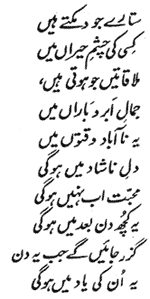 Adil Najam
Adil Najam
Yet another stalwart of Urdu literature is no more. Munir Niazi passed away at the age of 78.
As regular readers of this blog know, Munir Niazi is a particular favorite of mine. We have written about him and his poetry earlier (wondering whether it was him in the wonderful re-making of Mehdi Hasan’s ‘yeh watan tumhara hai‘; in thinking about song and poetry; and in terms of his literary rivalry with Ahmad Nadeem Qasmi, who died just a few months before him). We will, no doubt, write about it again later.
 His ‘mohabbat abb nahiN ho gi, yeh kuch din baad meiN ho gi’ and ‘humaisha dair kar daita houN meiN’ are especially poignant and I find his following Punjabi qata so often relevant to my own travails:
His ‘mohabbat abb nahiN ho gi, yeh kuch din baad meiN ho gi’ and ‘humaisha dair kar daita houN meiN’ are especially poignant and I find his following Punjabi qata so often relevant to my own travails:
kujh unj we raawaN aukhiaN sann
kujh gall icch gham da tauq ve see
kujh shehr dey louk ve zalim sann
kujh sanouN marran da souq ve see
Yes, the path I chose was hard
Yes, there was the noose of grief around my neck
Yes, the citizenry was also so cruel
But, ultimately, we too wanted to get killed
(coloquial for the last line: ‘we were suckers for punishment’; this is NOT a translation, just conveying the essential meaning)
Another favorite of mine is the following:
Kisee ko apnay amal ka jawab kiya daytay,
Swal saray ghalat thay jawab kiya daytay
Read Full Post
 Adil Najam
Adil Najam
On this auspicious day, we at ATP pray for peace and goodwill to all.
A couple of days ago we had done a post related to Christmas by celebrating the architectural heritage of Churches in Pakistan. Of course, one needs to go beyond structures and to the core of relations between Christian and non-Christian Pakistanis. It is in the content of that relationship that the essence of true Pakistaniat lies.
This picture, from Islamabad (published in Dawn 24 December, 2006) reminds me of the famous 1947 speech by Jinnah (whose birthday we are also celebrating today), where he says:
“… you are free- you are free to go to your temples mosques or any other place of worship in this state of Pakistan. You may belong to any religion, caste or creed that has nothing to do with the business of the state… in due course of time Hindus will cease to be Hindus and Muslims will cease to Muslims- not in a religious sense for that is the personal faith of an individual- but in a political sense as citizens of one state…”
Read Full Post
Guest Post by Yasser Latif Hamdani
 As we celebrate M.A. Jinnah’s birth anniversay today, December 25, it behoves us to think deep and hard on his true legacy (also see earlier Jinnah-related ATP Posts: The Other Side of Mr. Jinnah; Watch Jinnah-The Movie; 1947 Video-1; 1947 Video-2; Aazadi Mubarak; Independence Day Greetings for India; Remembering 9.11.1948).
As we celebrate M.A. Jinnah’s birth anniversay today, December 25, it behoves us to think deep and hard on his true legacy (also see earlier Jinnah-related ATP Posts: The Other Side of Mr. Jinnah; Watch Jinnah-The Movie; 1947 Video-1; 1947 Video-2; Aazadi Mubarak; Independence Day Greetings for India; Remembering 9.11.1948).
Those who criticize the current government for passing the Women’s Protection Bill would do well to remind themselves of the long and extremely effective legislative career of Pakistan’s founding father, Mr. Mahomed Ali Jinnah, as a member of the central legislative assembly of India.
Indeed the greatest tragedy of the subcontinent is that both India and Pakistan have chosen to selectively remember this great man, especially by choosing to ignore his politics prior to the Pakistan Movement. However if both India and Pakistan were to revisit Jinnah’s pre-1937 Indian nationalist career, we would find much to celebrate together, even if we continue to differ on his later role as the champion of Muslim separatism.
Read Full Post
 Adil Najam
Adil Najam His ‘mohabbat abb nahiN ho gi, yeh kuch din baad meiN ho gi’ and ‘humaisha dair kar daita houN meiN’ are especially poignant and I find his following Punjabi qata so often relevant to my own travails:
His ‘mohabbat abb nahiN ho gi, yeh kuch din baad meiN ho gi’ and ‘humaisha dair kar daita houN meiN’ are especially poignant and I find his following Punjabi qata so often relevant to my own travails:
 Adil Najam
Adil Najam As we celebrate M.A. Jinnah’s birth anniversay today, December 25, it behoves us to think deep and hard on his true legacy (also see earlier Jinnah-related ATP Posts:
As we celebrate M.A. Jinnah’s birth anniversay today, December 25, it behoves us to think deep and hard on his true legacy (also see earlier Jinnah-related ATP Posts: 






















































